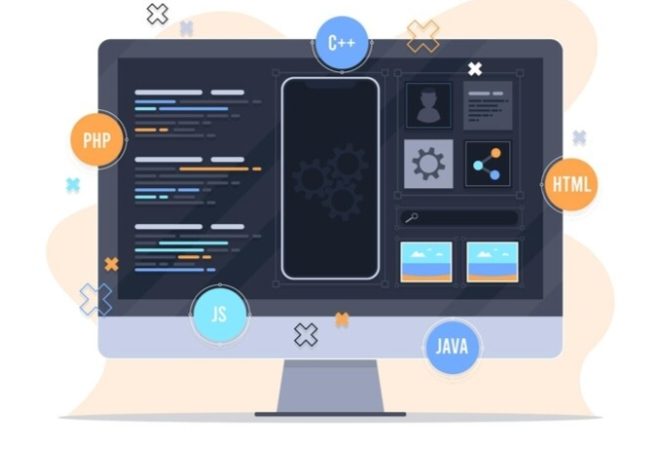Web Framework is a native-based website. Must be developed from scratch, using code programming. Of course, use a specific programming language script. Be it PHP, JavaScript, HTML, Python, Java, CSS, and the like. In order to build a more professional website appearance. Moreover, it is intended for a large scale.
Regarding database storage, we already use a server. No longer using hosting. Therefore, it is very suitable for use by companies and corporations. Moreover, Web Framework has various types. That way, you can choose according to your needs. So, for more details, check our UpGes presentation below, Guys!
Laravel
Web Framework ranks first, occupied by Laravel. It has become a favorite for most Web Developers or Programmers. Of course, in developing coding-based sites. The reason is, apart from being known as a platform that has credibility and quality. Moreover, it is armed with the best technological system. So, it makes it easier for developers to write programming scripts. Moreover, it is equipped with syntax that is easy to use and understand. In fact, it can not only be used to create websites. However, it can be used for application development. Even more amazing, Laravel allows your coding work to be developed quickly and efficiently. You don’t need to do any ground work. Because, various great features and functions are provided. These include: User Authentication, Caching, and Session Management. Provides a wide range of functionalities, for the purposes of developing modern PHP based sites. Because its performance has been optimized by having a core. Reliable and expandable, with various Add-Ons. Already connected to third party platforms and libraries. For example, AWS (Amazon Web Service). So, you can create coding websites and large-scale applications effectively. Moreover, there are asynchronous taxis available in the background. So, it can provide the best performance. Lastly, the Laravel framework has a very communicative and active community. So, it can help you increase relationships and share tutorials. For the sake of increasing coding capacity.
CodeIgniter
The next framework, which is also familiar among Web Developers, is CodeIgniter or usually called CI. Framework with PHP programming language, using MVC (Model View Controller) architecture. It has been equipped with different components. Works, for development tasks specifically. Proven, very friendly for use by Web Programmers. Because, features are easy to develop and scalable. So, it doesn’t take up a lot of space and is more efficient. CodeIgniter is very suitable for those of you who have just entered the world of Web Frameworks. The reason is, it is designed to be friendly for coding developers who are still junior. It doesn’t make it complicated for you to do web or application development. The performance is quite good. Moreover, if used for a simple server it will make the speed lighter. However, unfortunately, this platform is not yet equipped with an adequate security or security technology system.
Symphony
Symfony is a web application framework, written in the PHP programming language. Provides various tools and libraries, which make web application development easy. Starting from the simple, to the most complex. So, here are some of Symfony’s main features, including:
- Reusable Components : Symfony has many independent components, which can be reused. These include routing, templating, form handling, and others. These components can be used separately in other projects outside of Symfony.
- Flexibility : Symfony is very flexible, and can be customized according to needs. Developers can select and use only the components we need.
- Performance : Symfony is designed to have good performance. The caching feature is very sophisticated, it can speed up applications built with Symfony.
- Community and Documentation : Symfony has a large and active community. Very complete and detailed documentation. Makes it easier for developers to find solutions to the problems they face.
- Best Practices : Symfony follows best practices in software development. These include the use of PSR standards, dependency injection, and solid principles.
- Bundles : Symfony uses a bundle system. It is a package of features and functionality, which can be added to the application. Bundles make it easier to develop and maintain modular applications.
- Interoperability : Symfony is highly compatible with various libraries, and other tools in the PHP ecosystem. These include Doctrine (for ORM), Twig (for templating), and others.
With all these features, Symfony has become a popular choice for many Web Developers and companies. In order to build scalable and maintainable web applications.
CakePHP
CakePHP is an open-source framework. Functions for developing web applications written in the PHP programming language. A framework designed to help developers build web applications quickly. In fact, it’s even easier through the use of the Model-View-Controller (MVC) design pattern. So, here are some of the main features and explanations about CakePHP, including:
- MVC (Model-View-Controller)
Model : Deals with data and business logic. Manage application data, validation, data associations, and database queries.
View : Related to presentation and display of data to users. Generates HTML, XML, JSON, and other suitable formats.
Controller : Manages data flow, between Model and View. Handles user requests, calling appropriate models. In fact, determine the view that will be used to display the data.
- Conventions rather than Configurations
CakePHP uses the principle, “Convention over configuration”. This means that a lot of settings and configurations are usually required in other frameworks. Handled automatically, by CakePHP. If you follow certain naming conventions, and directory structures.
- ORM (Object-Relational Mapping)
CakePHP provides a powerful ORM system. Enables Web Developers to interact with databases using PHP objects. No need to write SQL queries directly.
- Scaffolding
The scaffolding feature allows Web Developers to quickly create basic applications. Of course, with CRUD (Create, Read, Update, Delete) functionality without the need to write a lot of code.
- Components and Helpers
CakePHP provides various components for reusable business logic. In fact, for helpers, namely in presentation and user interface tasks. So, it can facilitate application development.
- Security
CakePHP comes with various built-in security features. These include protection against SQL injection, XSS (Cross-Site Scripting), and CSRF (Cross-Site Request Forgery).
- International and Local
Supports translation and customization of applications, for various languages and regions.
- Testing
Supports unit and integration testing, through an integrated testing framework. Makes it easier for developers to write, and run tests. In order to ensure the application functions correctly.
CakePHP is well suited for web application development, which requires a clear and modular structure. Moreover, those who want to reduce the amount of code to write. With rich features, and complete documentation. So, CakePHP has become a popular choice among PHP developers.
Zend
Zend is a technology company, specializing in software development and services for PHP applications. Zend provides various products. A tool that helps developers in building, managing, and optimizing PHP-based applications. So, some of Zend’s main products include:
- Zend Server : A PHP application platform that provides tools for debugging, monitoring, and optimizing the performance of PHP applications.
- Zend Studio : An integrated development environment (IDE). Specially designed for PHP development with special features. These include debugging, profiling, and integration with various version management systems.
- Zend Framework : A PHP application framework, which provides modular components. Moreover, it can be reused to speed up web application development.
Zend also offers training, support, and consulting services. For the sake of helping developers and companies optimize the use of PHP technology. Additionally, Zend is active in the open source community and contributes to the development of PHP itself.
Several Others
Apart from the five web framework platforms above, there are others. These include: Phalcon, Yii, FuelPHP, ASP.NET, PHP, Python, and the like.
That’s the article from Us UpGes which discusses Web Framework. In relation to various types in particular. So, it can be a deeper insight for you. Of course, those who want to enter the world of web development professionally. OK Guys, that’s all from us and thank you.





